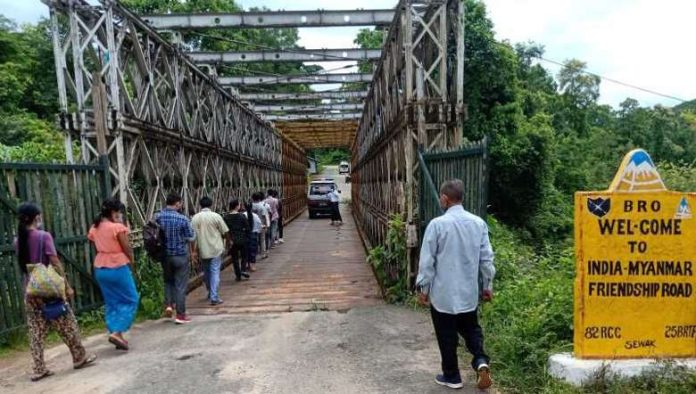The Sub-committee of the Manipur Cabinet has revealed that 2,187 individuals from Myanmar, classified as illegal immigrants, have established settlements in 41 locations across four districts. The sub-committee, led by Letpao Haokip, the Minister of Tribal Affairs and Hill Development in its report stated that Tengnoupal had the highest number of 1,147 Myanmar nationals residing, followed by 881 in Chandel, 154 in Churachandpur, and five in Kamjong.
In March and April, the sub-committee, including state Ministers Awangbow Newmai and Thounaojam Basanta, visited the tribal-dominated districts. They met with the illegal immigrants, discussing providing humanitarian relief and shelters.
Prior to the outbreak of ethnic violence on May 3, the Manipur government had planned to identify and detain the Myanmar nationals who had sought asylum in the state.
Around 5,000 immigrants, including women and children, have fled from the conflict-ridden Myanmar since the coup by Myanmar Junta in February 2021.
Interestingly, the report is presented by CSC chaired by Letpao Haokip, who himself has aligned with the Kuki causes. He along with nine other tribal MLAs, has called for a separate administration in response to the ethnic violence that occurred on May 3. Among the ten MLAs, seven, including Haokip, belong to the BJP. Recently, Chief Minister N. Biren Singh attributed the ongoing unrest in the state to infiltrators from across the border and militants, emphasizing that it are not a conflict between two communities. Manipur shares a 398 km unfenced border with Myanmar.
Illegal immigration, a reality of decades
According to an official report, illegal immigrants’ identification created a panic among them. During the identification drive, it was observed that they not only have migrated to Manipur in large numbers but also have formed their own village. Concerned by this, government proposed building shelter homes for them. But the illegal immigrants strongly objected to it, contributing to the recent outbreak of violence, as mentioned in the report.
The report also highlights the impact of the Manipur government’s ‘War on Drugs’ campaign on the poppy cultivation and narcotics business run by Myanmar nationals in the state. Influential illegal poppy cultivators and drug lords from Myanmar, who have settled in Manipur, have fueled the recent violence.
Various Kuki Civil Society Organizations (CSOs) have accused the Manipur government of harassing Indian citizens under the pretext of identifying illegal immigrants. However, illegal immigration has been the reality of Manipur. Chins from Myanmar and Kukis belong to same Tibeto-Mongoloid race and hence have linguistic and cultural similarities. This makes it difficult to differentiate between them. Kukis have also been accused of supporting illegal immigration to change the demography of the region.
So far, the state has suffered alot by ethnic violence between the Meitei community, which is predominant in the valley, and the Kuki tribe, which is predominant in the hills. The violence has claimed the lives of over 120 people and left more than 400 injured, belonging to different communities.

